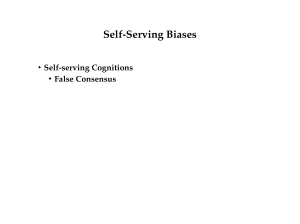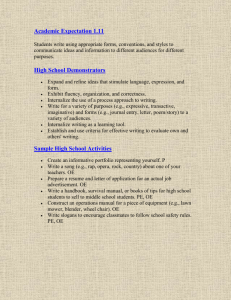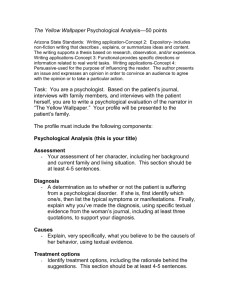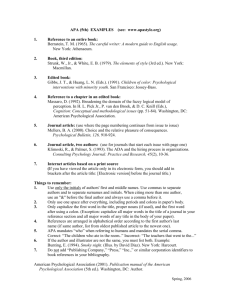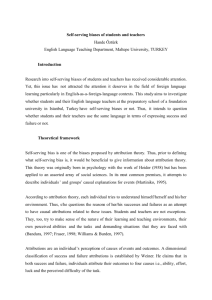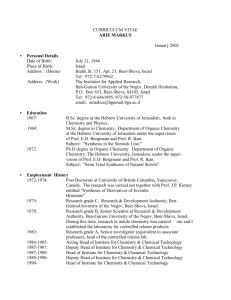SELF-SERVING BIAS SELF
advertisement
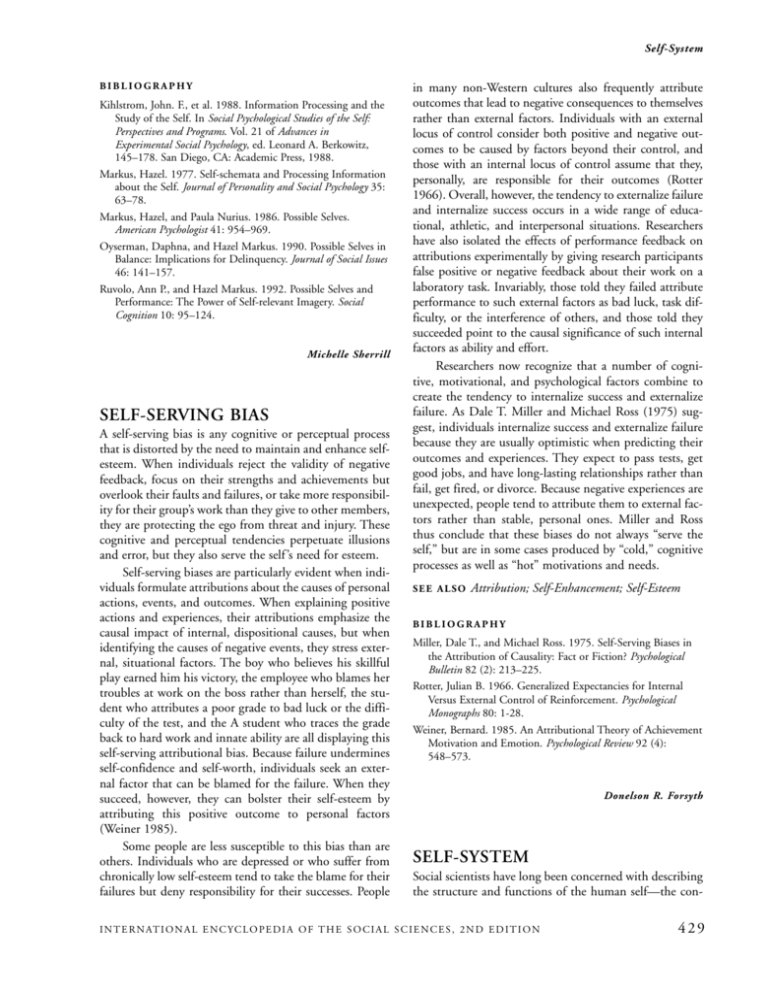
Self-System BIBLIOGRAPHY Kihlstrom, John. F., et al. 1988. Information Processing and the Study of the Self. In Social Psychological Studies of the Self: Perspectives and Programs. Vol. 21 of Advances in Experimental Social Psychology, ed. Leonard A. Berkowitz, 145–178. San Diego, CA: Academic Press, 1988. Markus, Hazel. 1977. Self-schemata and Processing Information about the Self. Journal of Personality and Social Psychology 35: 63–78. Markus, Hazel, and Paula Nurius. 1986. Possible Selves. American Psychologist 41: 954–969. Oyserman, Daphna, and Hazel Markus. 1990. Possible Selves in Balance: Implications for Delinquency. Journal of Social Issues 46: 141–157. Ruvolo, Ann P., and Hazel Markus. 1992. Possible Selves and Performance: The Power of Self-relevant Imagery. Social Cognition 10: 95–124. Michelle Sherrill SELF-SERVING BIAS A self-serving bias is any cognitive or perceptual process that is distorted by the need to maintain and enhance selfesteem. When individuals reject the validity of negative feedback, focus on their strengths and achievements but overlook their faults and failures, or take more responsibility for their group’s work than they give to other members, they are protecting the ego from threat and injury. These cognitive and perceptual tendencies perpetuate illusions and error, but they also serve the self ’s need for esteem. Self-serving biases are particularly evident when individuals formulate attributions about the causes of personal actions, events, and outcomes. When explaining positive actions and experiences, their attributions emphasize the causal impact of internal, dispositional causes, but when identifying the causes of negative events, they stress external, situational factors. The boy who believes his skillful play earned him his victory, the employee who blames her troubles at work on the boss rather than herself, the student who attributes a poor grade to bad luck or the difficulty of the test, and the A student who traces the grade back to hard work and innate ability are all displaying this self-serving attributional bias. Because failure undermines self-confidence and self-worth, individuals seek an external factor that can be blamed for the failure. When they succeed, however, they can bolster their self-esteem by attributing this positive outcome to personal factors (Weiner 1985). Some people are less susceptible to this bias than are others. Individuals who are depressed or who suffer from chronically low self-esteem tend to take the blame for their failures but deny responsibility for their successes. People in many non-Western cultures also frequently attribute outcomes that lead to negative consequences to themselves rather than external factors. Individuals with an external locus of control consider both positive and negative outcomes to be caused by factors beyond their control, and those with an internal locus of control assume that they, personally, are responsible for their outcomes (Rotter 1966). Overall, however, the tendency to externalize failure and internalize success occurs in a wide range of educational, athletic, and interpersonal situations. Researchers have also isolated the effects of performance feedback on attributions experimentally by giving research participants false positive or negative feedback about their work on a laboratory task. Invariably, those told they failed attribute performance to such external factors as bad luck, task difficulty, or the interference of others, and those told they succeeded point to the causal significance of such internal factors as ability and effort. Researchers now recognize that a number of cognitive, motivational, and psychological factors combine to create the tendency to internalize success and externalize failure. As Dale T. Miller and Michael Ross (1975) suggest, individuals internalize success and externalize failure because they are usually optimistic when predicting their outcomes and experiences. They expect to pass tests, get good jobs, and have long-lasting relationships rather than fail, get fired, or divorce. Because negative experiences are unexpected, people tend to attribute them to external factors rather than stable, personal ones. Miller and Ross thus conclude that these biases do not always “serve the self,” but are in some cases produced by “cold,” cognitive processes as well as “hot” motivations and needs. SEE ALSO Attribution; Self-Enhancement; Self-Esteem BIBLIOGRAPHY Miller, Dale T., and Michael Ross. 1975. Self-Serving Biases in the Attribution of Causality: Fact or Fiction? Psychological Bulletin 82 (2): 213–225. Rotter, Julian B. 1966. Generalized Expectancies for Internal Versus External Control of Reinforcement. Psychological Monographs 80: 1-28. Weiner, Bernard. 1985. An Attributional Theory of Achievement Motivation and Emotion. Psychological Review 92 (4): 548–573. Donelson R. Forsyth SELF-SYSTEM Social scientists have long been concerned with describing the structure and functions of the human self—the con- I N T E R N AT I O N A L E N C Y C L O P E D I A O F T H E S O C I A L S C I E N C E S , 2 N D E D I T I O N 429
